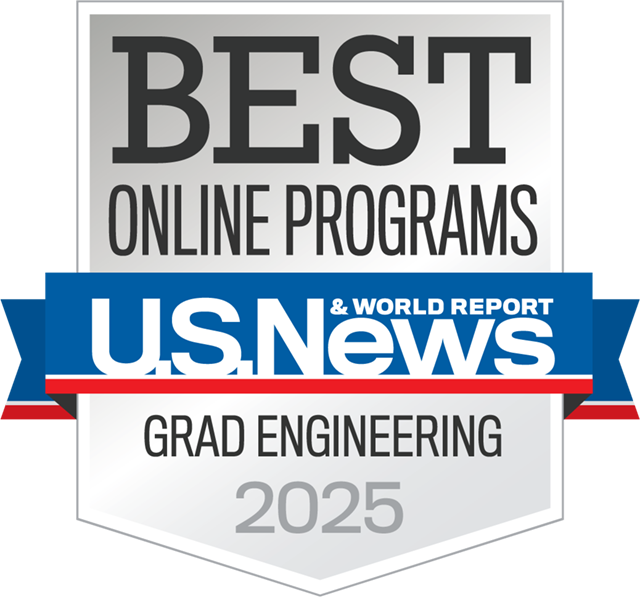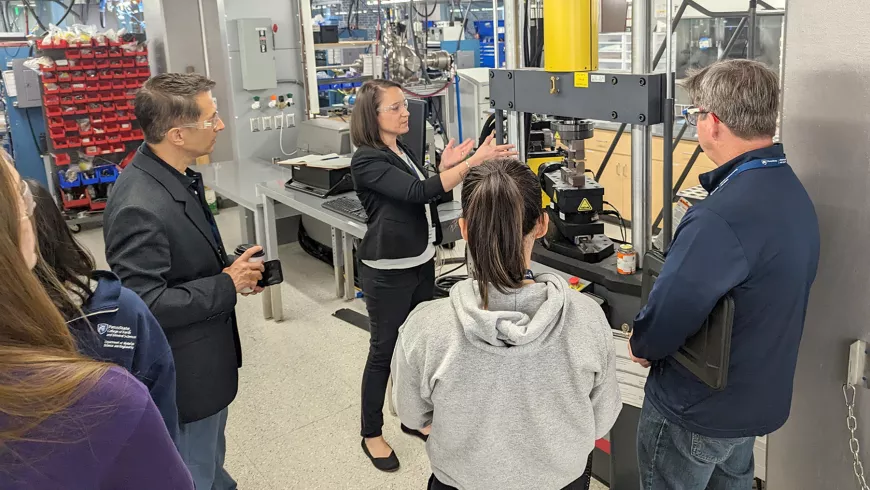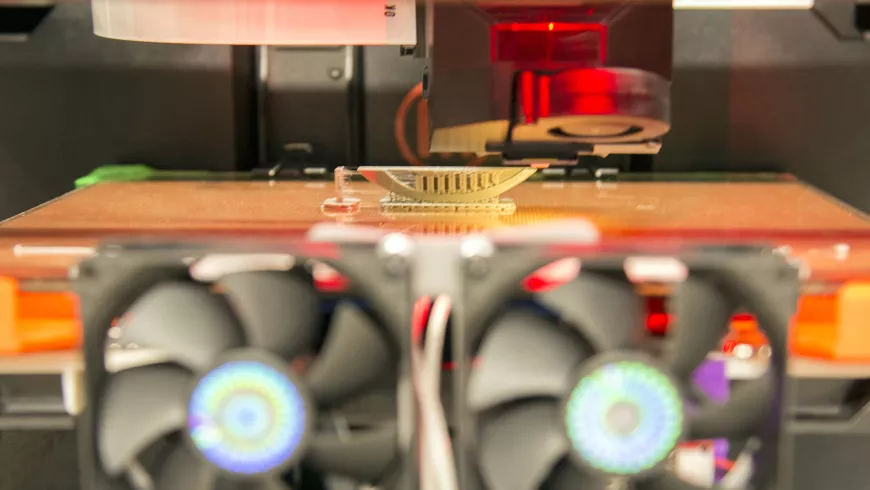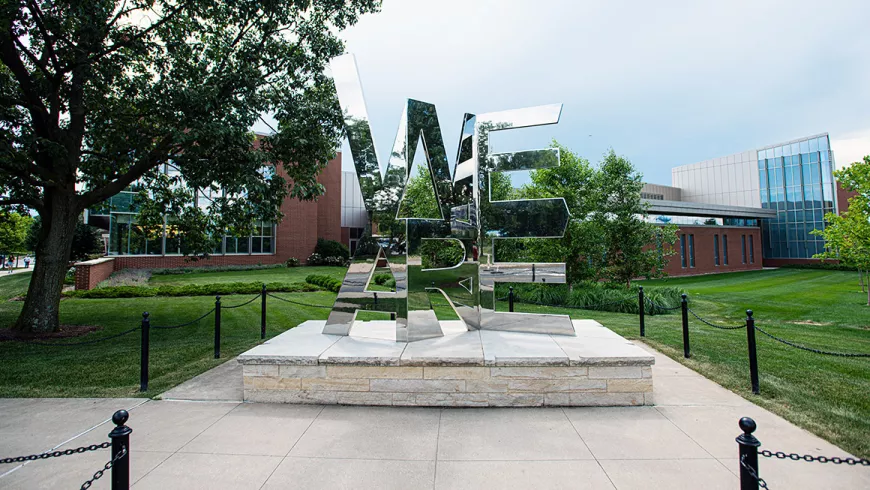100% Online
Complete your Penn State course work at your own pace and 100% online.
Application deadline
Credits and costs
Nationally Recognized

Gain Skills to Excel in the Interdisciplinary Field of Additive Manufacturing and Design
Increase your career opportunities by exploring the fast-growing field of 3D printing.
Apply foundational knowledge, critical thinking, problem-solving, and creativity to your use of additive manufacturing and associated design tools and methods.
Explore how everything, from medical devices to aerospace structures, is designed, engineered, manufactured, certified, and brought to market through additive manufacturing.
Develop your professional identity by selecting core and elective courses that fit your goals.
Become a Well-Rounded Engineer with These Courses
Become a Well-Rounded Engineer with These Courses
Become part of a group of engineers that are versed not only in technical tools and engineering skills, but also in communication, ethics, and professionalism.
This integrated study of 3D printing can help you acquire practical skills and techniques to not only digitally design but also develop, analyze, numerically model, optimize, fabricate, and inspect new components and subassemblies using additive manufacturing technologies. Gain skills that can be applicable in a wide range of industries, including aerospace, consumer goods, energy, medical, oil and gas, and space.
All AMD students will be required to enroll in five core courses that cover additive manufacturing processes, materials for additive manufacturing, the engineering and scientific foundations of additive manufacturing, design for additive manufacturing, and laboratory experience in additive manufacturing.
In addition to the core courses, students will be required to enroll in electives (9 credits) that include design, materials, manufacturing, technical writing, technical presentations, and supply chain, along with enrolling in a seminar course (1 credit, not counted toward the degree). To meet the degree requirements, students will also be required to complete a culminating project that leads to a paper, which will be worth three (3) credits.
Core Courses (19 credits)
You must successfully complete one 1-credit course of Colloquium, preferably in your first two semesters of the program. The following courses are offered to meet this requirement: AMD 590 and ME 590.
- 4credits
Comprehensive study of the fundamentals, process characteristics, economics, and practical applications of various additive manufacturing processes.
- 4credits
Explores processes with a focus on the fundamentals of sintering and fusion of metals, ceramics, and polymers.
- 4credits
Explore design methods and tools for additive manufacturing, including opportunistic and restrictive aspects of different additive manufacturing processes and their related industry applications.
- 3credits
Explore all aspects of metal additive manufacturing including design, prototyping, build preparation, fabrication, post-processing, machining, inspection, and characterization.
- 4credits
Focuses on the state of the art in understanding processing, structure, and property relationships in materials fabricated using additive manufacturing.
Electives (8-9 credits)
At least eight (8) credit hours in 400- and/or 500-level courses from an approved electives course list maintained by the program. Note that EDSGN 596, ESC 596, IE 596, MATSE 596, and ME 596 cannot be used to fulfill this requirement.
Culminating Project and Research (3 credits)
- 3credits
Creative projects, including non-thesis research, which are supervised on an individual basis and which fall outside the scope of formal courses.
- Note
AMD 596 must be scheduled over two semesters in a 1-credit/2-credit consecutive sequence for a total of 3 credits.
Course Availability
If you're ready to see when your courses will be offered, visit our public LionPATH course search (opens in new window) to start planning ahead.
Start or Advance Your Career

Start or Advance Your Career
You can use the knowledge gained from this program and the support of Penn State career resources to pursue careers in a variety of fields, depending on your goals.
Job Titles Related to This Degree
The following roles are often held by people with this type of degree:
- Advanced Manufacturing Engineer
- Design Engineer
- Manufacturing Process Engineer
- Process Engineering Manager
Employment Outlook for Occupational Fields Related to This Degree
Estimates of employment growth and total employment are provided by the U.S. Bureau of Labor Statistics and are subject to change. While these occupations are often pursued by graduates with this degree, individual outcomes may vary depending on a variety of factors. Penn State World Campus cannot guarantee employment in a given occupation.
Industrial Engineers
Engineers, All Other
Career Services to Set You Up for Success

From the day you're accepted as a student, you can access resources and tools provided by Penn State World Campus Career Services to further your career. These resources are beneficial whether you're searching for a job or advancing in an established career.
- Opportunities to connect with employers
- Career counselor/coach support
- Occupation and salary information
- Internships
- Graduate school resources
Ready to Learn More?
Get the resources you need to make informed decisions about your education. Request information on this program and other programs of interest by completing this form.
Ready to take the next step toward your Penn State master's degree?
Costs and Financial Aid
Costs and Financial Aid
Learn about this program's tuition, fees, scholarship opportunities, grants, payment options, and military benefits.
Graduate Tuition
Graduate tuition is calculated based on the number of credits for which you register. Tuition is due shortly after each semester begins and rates are assessed every semester of enrollment.
2024–25 Academic Year Rates
| How many credits do you plan to take per semester? | Cost |
|---|---|
| 11 or fewer | $1,143 per credit |
| 12 or more | $13,723 per semester |
2025–26 Academic Year Rates
| How many credits do you plan to take per semester? | Cost |
|---|---|
| 11 or fewer | $1,154 per credit |
| 12 or more | $13,860 per semester |
Financial Aid and Military Benefits
Some students may qualify for financial aid. Take the time to research financial aid, scholarships, and payment options as you prepare to apply. Federal financial aid may only be used to pay for credits used to satisfy program requirements.
Military service members, veterans, and their spouses or dependents should explore these potential military education benefits and financial aid opportunities, as well.
Additional Cost of Attendance Details
To view the detailed list of cost of attendance elements:
- visit the Tuition Information site
- click the plus sign to expand the table
- select a semester from the World Campus row
Technical Requirements
Review the technical requirements for this program.
Note about additional hardware: It is a requirement for this online program that students have ready access to a document scanner that allows for the creation of PDF files, which will enable students to submit handwritten homework and exams in several of the mathematics-based courses.
Earn a Valuable Credential along the Way

Earn a Valuable Credential along the Way
Show mastery of specific subjects before your degree is complete. Thanks to shared courses across programs, students can often earn a certificate along with their degree in less time than if they earned them separately.
Certificate Programs Related to This Degree
The following certificates can be earned while completing this degree program:
Establish foundational knowledge of additive manufacturing (3D printing) and improve the critical thinking, problem-solving, and creativity skills needed by additive manufacturing engineers with this online certificate program.
Learn more about the Graduate Certificate in Additive Manufacturing and DesignSupplement your technical engineering skills with courses focused on communication, ethics, entrepreneurial thinking, and professionalism. This online certificate program was designed for working engineering professionals who want to prepare for leadership positions.
Learn more about the Graduate Certificate in Engineering Leadership and Innovation ManagementBecome a Leader in 3D Printing
This graduate program can help you grow as a leader in 3D printing and prototyping. You can learn to accelerate industry adoption of additive manufacturing while striving to advance the technology and develop innovative solutions.
Set Your Own Pace

Set Your Own Pace
Whether you are looking to finish your program as quickly as possible or balance your studies with your busy life, Penn State World Campus can help you achieve your education goals. Many students take one or two courses per semester.
Our online courses typically follow a 12- to 15-week semester cycle, and there are three semesters per year (spring, summer, and fall). If you plan to take a heavy course load, you should expect your course work to be your primary focus and discuss your schedule with your academic adviser.
To Finish Your Degree in One to Two Years
- Take 3–4 courses each semester
To Finish Your Degree in Two to Three Years
- Take 2–3 courses each semester
To Finish Your Degree in Three to Four Years
- Take 1 course each semester
Timelines may vary based on course availability.
Convenient Online Format
This program's convenient online format gives you the flexibility you need to study around your busy schedule. You can skip the lengthy commute without sacrificing the quality of your education and prepare yourself for more rewarding career opportunities without leaving your home.
A Trusted Leader in Online Education

Penn State has a history of more than 100 years of distance education, and World Campus has been a leader in online learning for more than two decades. Our online learning environment offers the same quality education that our students experience on campus.
How to Apply to Penn State

How to Apply to Penn State
Apply by September 1 to start January 12
Application Instructions
Deadlines and Important Dates
Complete your application and submit all required materials by the appropriate deadline. Your deadline will depend on the semester you plan to start your courses.
Spring Deadline
Apply by September 1 to start January 12Summer Deadline
Apply by March 1 to start May 18Fall Deadline
Apply by June 1, 2026, to start August 24, 2026
Steps to Apply
For admission to the J. Jeffrey and Ann Marie Fox Graduate School, an applicant must hold either (1) a baccalaureate degree in engineering, engineering technology, manufacturing, materials science, or a related discipline from a regionally accredited U.S. institution or (2) a tertiary (postsecondary) degree that is deemed comparable to a four-year bachelor's degree from a regionally accredited U.S. institution. This degree must be from an officially recognized degree-granting institution in the country in which it operates.
For admission to the program, a 3.0 grade-point average (or equivalent) is needed. Exceptions to the minimum 3.0 GPA may be made for students with special backgrounds, abilities, and interest. A minimum of 2–3 years of relevant work experience is recommended.
Applications are submitted electronically and include a nonrefundable application fee. You will need to upload the following items as part of your application:
Official transcripts from each institution attended, regardless of the number of credits or semesters completed. Transcripts not in English must be accompanied by a certified translation. If you are a Penn State alum, you do not need to request transcripts for credits earned at Penn State but must list Penn State as part of your academic history.
GPA and Test Scores — All applicants are expected to have earned a junior/senior grade-point average of 3.0 or higher. Official GRE scores are not required but will be considered if submitted. GRE scores can be submitted using institution code 2660.
English Proficiency — The language of instruction at Penn State is English. With some exceptions, international applicants must take and submit scores for the Test of English as a Foreign Language (TOEFL) or International English Language Testing System (IELTS). Minimum test scores and exceptions are found in the English Proficiency section on the Fox Graduate School's "Requirements for Graduate Admission" page. Visit the TOEFL website for testing information. Penn State's institutional code is 2660.
References (3) — You will need to initiate the process through the online application by entering names, email addresses, and mailing addresses of three references. Upon submission of your application, an email will be sent to each reference requesting they complete a brief online recommendation regarding your commitment to success in an online program. Please inform all recommenders they must submit the form in order for your application to be complete.
Program-Specific Questions/Materials
Résumé — Upload your résumé to the online application. One-to two-page listing of your professional experience and education.
To begin the online application, you will need a Penn State account.
Create a New Penn State Account
If you have any problems during this process, contact an admissions counselor at [email protected].
Please note: Former Penn State students may not need to complete the admissions application or create a new Penn State account. Please visit our Returning Students page for instructions.
You can begin your online application at any time. Your progress within the online application system will be saved as you go, allowing you to return at any point as you gather additional information and required materials.
- Choose Enrollment Type: "Degree Admission"
- Choose "WORLD CAMPUS" as the campus
Checking Your Status
You can check the status of your application by using the same login information established for the online application form.5. Complete the application.
Admissions Help
If you have questions about the admissions process, contact an admissions counselor at [email protected].
Contact Us

Contact Us
Have questions or want more information? We're happy to talk.
To learn more about the Master of Engineering in Additive Manufacturing and Design, offered in partnership with the Penn State College of Engineering, School of Engineering Design and Innovation, along with the College of Earth and Mineral Sciences, please contact:
Allison M. Beese, Ph.D.
Professor, Materials Science and Engineering and Mechanical Engineering
Director, Additive Manufacturing & Design Graduate Program
[email protected]
Learn from the Best
Learn from the Best
This multidisciplinary graduate-level program — the first of its kind in the country — is offered in partnership with the Penn State College of Engineering and the School of Engineering Design and Innovation, along with the College of Earth and Mineral Sciences.
You will take courses taught by faculty who are active in research and experts in fields such as:
- 3D printing
- rapid prototyping
- CAD/CAM
- additive manufacturing
- materials science
- technology innovation
- leadership
Faculty
Allison Beese
- DegreePh.D., Mechanical Engineering, Massachusetts Institute of Technology
- DegreeM.S., Mechanical Engineering, Massachusetts Institute of Technology
- DegreeB.S., Mechanical Engineering, Penn State
Dr. Allison Beese is a professor of materials science and engineering and mechanical engineering. Her research interests are in experimental and computational multiscale mechanics of materials ranging from metals to composites. Her research focuses on developing experimental methods to elucidate the connections among the microstructure, macroscopic deformation, damage accumulation, and failure properties of materials. Using experimental data, physically based large deformation and failure models can be developed to predict component performance.
Joseph Bartolai
- DegreePh.D., Mechanical Engineering, Penn State
- DegreeM.S., Mechanical Engineering, Penn State
- DegreeB.S., Mechanical Engineering, Penn State
Dr. Joseph Bartolai is an assistant research professor at the Penn State Applied Research Laboratory. Dr. Bartolai's research areas of interest include thermoplastic polymers, lattice structures, build optimization, in-situ temperature measurement, and mechanical testing.
Amrita Basak
- DegreePh.D., Mechanical Engineering, Georgia Institute of Technology
- DegreeM.S., Aerospace Engineering, Georgia Institute of Technology
- DegreeM.Tech., Chemical Engineering, Indian Institute of Technology, Kanpur
- DegreeB.E., Chemical Engineering, Jadavpur University
Dr. Amrita Basak is an assistant professor of mechanical engineering. Dr. Basak's research areas of interest include design and manufacturing, mechanical sciences, computational analysis, sensors and controls, and thermal/fluid sciences.
David Corbin
- DegreePh.D., Mechanical Engineering, Penn State
- DegreeM.S., Mechanical Engineering, Penn State
- DegreeB.S., Mechanical Engineering, Penn State
Dr. David Corbin is an assistant research professor at the Penn State Applied Research Laboratory. Dr. Corbin's research areas of interest include prediction and control of part deformation, sensor/data analytics for determining the quality of AM components, process control, and machine learning.
Sanjay Joshi
- DegreePh.D., Industrial Engineering, Purdue University
- DegreeM.S., Industrial Engineering, SUNY Buffalo
- DegreeB.E., Production Engineering, University of Bombay
Dr. Sanjay Joshi is a professor of industrial and manufacturing engineering. His research and teaching interests are in the areas of computer-aided design and manufacturing (CAD/CAM), with specific focus on computer-aided process planning, additive manufacturing, control of automated flexible manufacturing systems, and topics in advanced manufacturing.
Nicholas Meisel
- DegreePh.D., Mechanical Engineering, Virginia Polytechnic Institute and State University
- DegreeB.S., Mechanical Engineering, Virginia Commonwealth University
Dr. Nicholas Meisel is an assistant professor of engineering design and mechanical engineering in the School of Engineering Design, Technology, and Professional Programs at Penn State. He is the director of the Made by Design Lab, which conducts research in the area of design for additive manufacturing (DfAM) as well as its role in engineering education. Dr. Meisel's current research centers on high-level, innovative DfAM concepts (e.g., functionally graded multi-material printing, in-situ embedding) and the impact of process parameters on part design and manufacturability.
Ted Reutzel
- DegreePh.D., Mechanical Engineering, Penn State
- DegreeM.S., Mechanical Engineering, Georgia Institute of Technology
- DegreeB.S., Mechanical Engineering, Penn State
Dr. Ted Reutzel has been involved in arc- and laser-based metal processing since 1993, with emphasis on welding and cladding, and more recently with emphasis on metal-based additive manufacturing. He has managed numerous programs to investigate and implement laser material processing across a wide range of applications. He has also authored and co-authored book chapters and provided invited articles and invited talks internationally.
News




